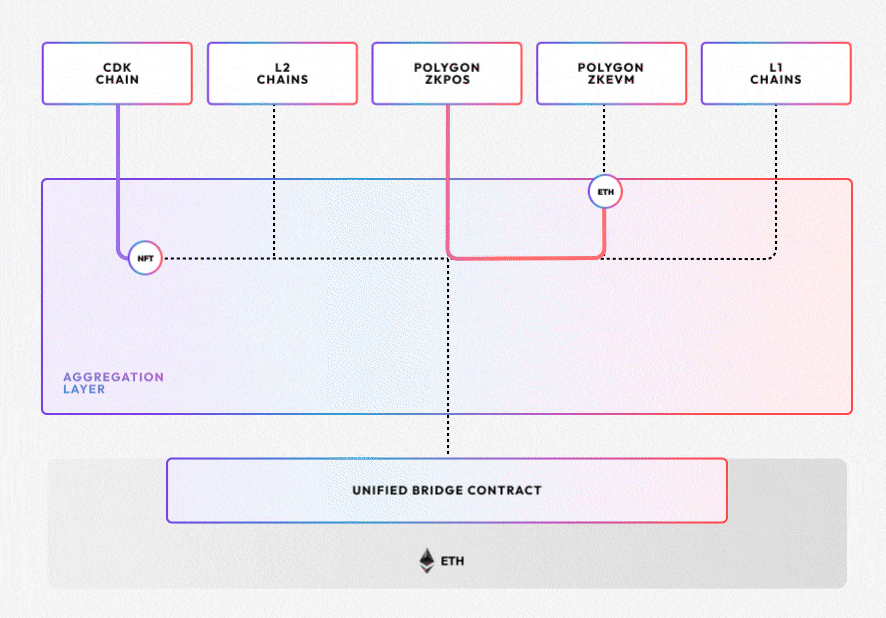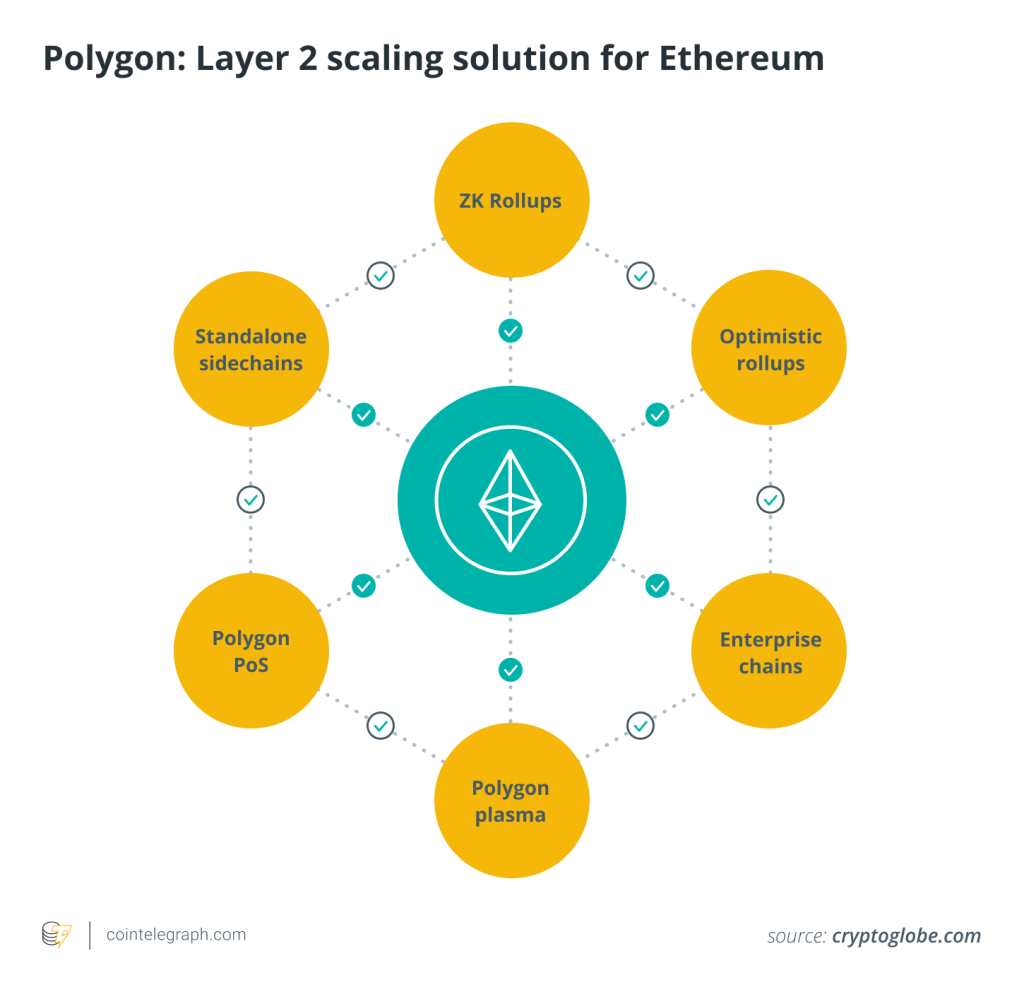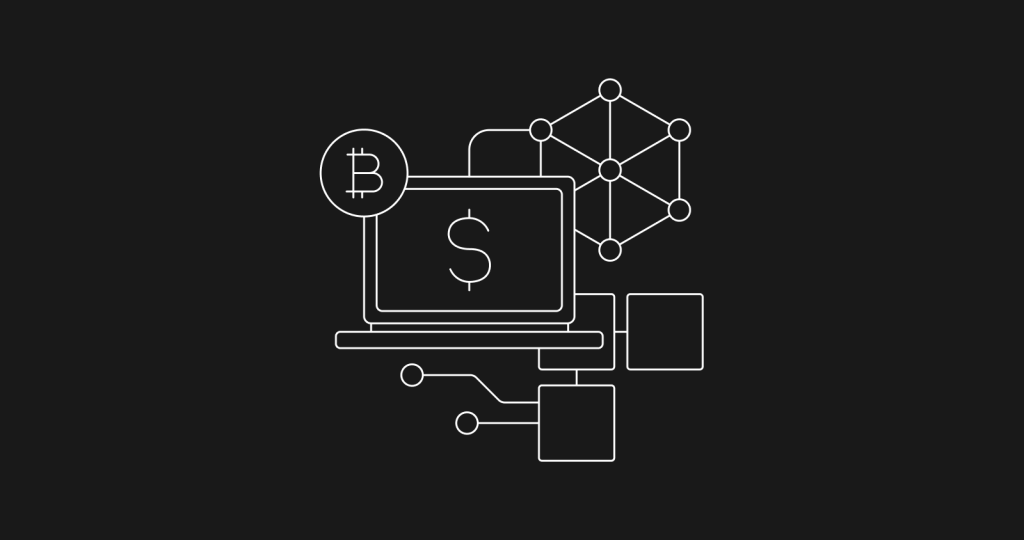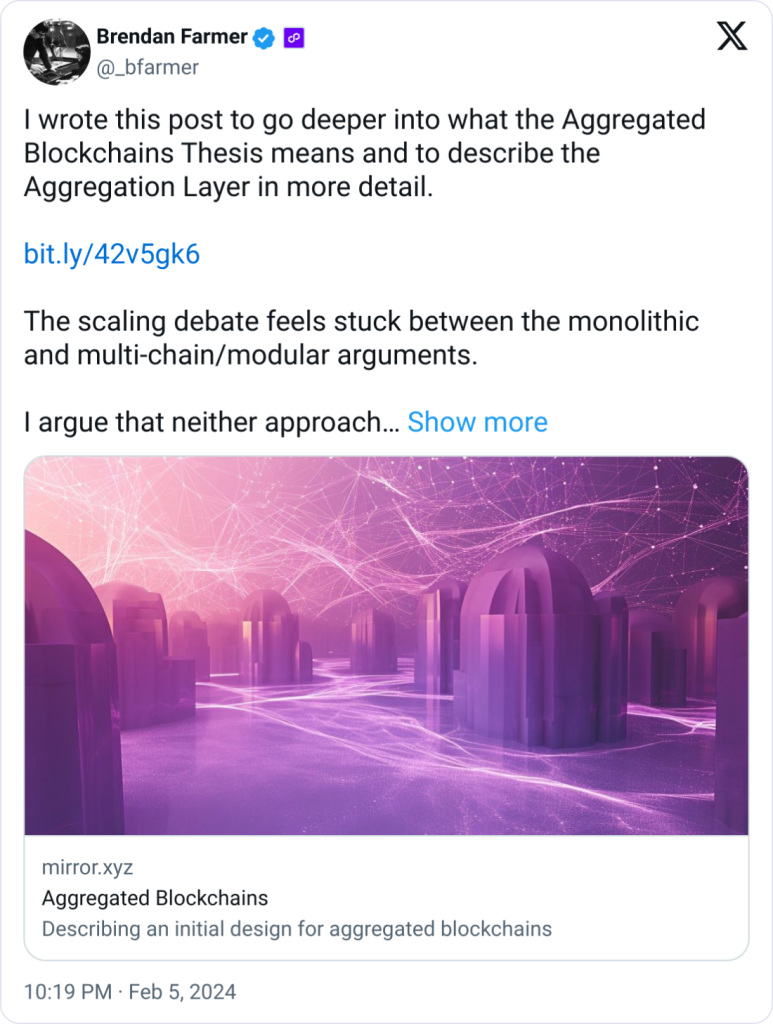Polygon AggLayer to make multiple blockchains feel like ’a single chain’

Next month, Polygon Labs will launch a protocol to make all blockchains feel like a single network for the end-user.

A new protocol from Ethereum-scaling solutions developer Polygon Labs promises to unite what it calls the “divided blockchain landscape” into a web of networks that “feels like a single chain.
In a Jan. 24 blog post, Polygon said its AggLayer solution, set to launch next month, aims to aggregate zero-knowledge (ZK) proofs from multiple blockchains and allow developers to connect layer 1 and 2 blockchains to merge them into a single network.
For end users, Polygon Labs claims the user experience will be “like the internet,” and users won’t have to undertake “cumbersome and frequent bridging” to use other chains.

Polygon Labs’ AggLayer use case example involved a user on Ethereum L2 chain X1 holding Dai (DAI) and buying a nonfungible token (NFT) on Polygon’s zero knowledge Ethereum Virtual Machine (zkEVM) without first bridging DAI to the zkEVM.
“From the end-user perspective, this will feel like using a single chain,” it wrote. “Users can interact with [decentralized applications] without needing to know that they are accessing another chain.”
Polygon Labs’ reason for making AggLayer stems from its belief that blockchains should be a “unified, highly scalable network” similar to the internet but are currently “siloed and lacking interoperability” with users facing poor user experience and scaling limitations.
Related: Bitcoin-based ‘rival’ to modern stablecoins to emerge soon — CoinShares
It claimed AggLayer will improve the now-widely in-use monolithic and modular blockchain architectures.
Monolithic blockchains — like Bitcoin — have functions such as transactions, settlements and data availability on a single layer. Modular chains — like post-Merge Ethereum — distribute these functions across layers aiming to enhance efficiency.
“Aggregation synthesizes the benefits of both integrated (monolithic) and modular architectures using ZK technology,” Polygon Labs wrote.
The first version is slated for launch in February, with a second version pinned for later in the year, which Polygon Labs said will support asynchronous cross-chain transactions.






… [Trackback]
[…] Read More Information here to that Topic: x.superex.com/news/blockchain/3544/ […]
… [Trackback]
[…] Find More Info here to that Topic: x.superex.com/news/blockchain/3544/ […]
… [Trackback]
[…] Read More on on that Topic: x.superex.com/news/blockchain/3544/ […]
… [Trackback]
[…] Find More on that Topic: x.superex.com/news/blockchain/3544/ […]
… [Trackback]
[…] Find More Information here on that Topic: x.superex.com/news/blockchain/3544/ […]
… [Trackback]
[…] There you will find 47954 more Information on that Topic: x.superex.com/news/blockchain/3544/ […]
… [Trackback]
[…] There you will find 27572 additional Info on that Topic: x.superex.com/news/blockchain/3544/ […]
… [Trackback]
[…] Read More Info here on that Topic: x.superex.com/news/blockchain/3544/ […]
… [Trackback]
[…] Here you can find 9867 additional Info on that Topic: x.superex.com/news/blockchain/3544/ […]
… [Trackback]
[…] Information on that Topic: x.superex.com/news/blockchain/3544/ […]
… [Trackback]
[…] Find More Info here on that Topic: x.superex.com/news/blockchain/3544/ […]
… [Trackback]
[…] There you can find 18143 more Info on that Topic: x.superex.com/news/blockchain/3544/ […]
… [Trackback]
[…] Information to that Topic: x.superex.com/news/blockchain/3544/ […]
… [Trackback]
[…] Here you can find 61400 additional Information on that Topic: x.superex.com/news/blockchain/3544/ […]
… [Trackback]
[…] Info on that Topic: x.superex.com/news/blockchain/3544/ […]
… [Trackback]
[…] Here you will find 8864 more Information on that Topic: x.superex.com/news/blockchain/3544/ […]
… [Trackback]
[…] Info on that Topic: x.superex.com/news/blockchain/3544/ […]
… [Trackback]
[…] Read More Information here to that Topic: x.superex.com/news/blockchain/3544/ […]
… [Trackback]
[…] Read More to that Topic: x.superex.com/news/blockchain/3544/ […]
… [Trackback]
[…] Read More Info here on that Topic: x.superex.com/news/blockchain/3544/ […]
… [Trackback]
[…] Find More Information here to that Topic: x.superex.com/news/blockchain/3544/ […]
… [Trackback]
[…] Find More Info here to that Topic: x.superex.com/news/blockchain/3544/ […]
… [Trackback]
[…] Read More Information here to that Topic: x.superex.com/news/blockchain/3544/ […]
… [Trackback]
[…] Information to that Topic: x.superex.com/news/blockchain/3544/ […]
… [Trackback]
[…] Information to that Topic: x.superex.com/news/blockchain/3544/ […]
… [Trackback]
[…] Find More Information here to that Topic: x.superex.com/news/blockchain/3544/ […]
… [Trackback]
[…] Here you can find 46859 additional Information to that Topic: x.superex.com/news/blockchain/3544/ […]
… [Trackback]
[…] Read More on to that Topic: x.superex.com/news/blockchain/3544/ […]